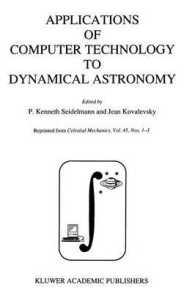Full Description
This timely and thought-provoking book explores how artificial intelligence (AI) and digital technologies more generally are reshaping educational assessment in the field of mathematics. It brings together a rich collection of international perspectives that offer a diverse and critical examination of the opportunities and challenges that digital technologies, including artificial intelligence, play in assessment.
The chapters span a broad range of topics including the transition to a digital assessment format, designing multiple-choice items, and the use of AI for automated diagnosis, example generation, and feedback provision. The book includes a framing chapter that critically examines current trends in the field and offers key recommendations for rethinking assessment. It calls for more empirical research and a fundamental rethink of assessment practices in light of digital technologies and AI. The volume as a whole also invites readers to engage in a broader conversation about the future of educational assessment and the role of digital technologies in transforming assessment in mathematics education.
This essential resource for educators, researchers, curriculum developers, policymakers, and assessment stakeholders offers a comprehensive look at the evolving international landscape of assessment in mathematics education in the digital era. It also highlights directions for future research and encourages readers to shaping the future of digital technology and artificial intelligence in formative and summative assessment in mathematics education.
The Open Access version of this book, available at www.taylorfrancis.com, has been made available under a Creative Commons Attribution-Non Commercial-No Derivatives (CC-BY-NC-ND) 4.0 license.
Contents
1. Setting the scene on the use of technologies and artificial intelligence in feedback and assessment in mathematics education 2. The transfer of assessment from pen and paper to e-assessment: two case studies from one theoretical perspective 3. Digital technology and assessment validity: Exploring utilisation schemes for a basic spreadsheet tool used in PISA 2022 4. High-stakes mathematics assessment in Finland 5. Teachers insights from digital formative assessment compared to traditional pencil and paper assessments in elementary school geometry 6. Adaptive Feedback and (digital) Assessment of Conceptual Knowledge 7. Advancing Automated Assessment for Open-Ended Questions in Mathematics 8. A reconceptualisation of the instrumental genesis process in the context of human-LLM interactions: exploring students' perspective on their use of GPT-4o as a tool to support self-assessment 9. The power of well-designed multiple-choice items to enhance mathematics teaching and learning 10. Example-generation tasks for computer-aided assessment 11. Students' interaction with and appreciation of automated informative tutoring feedback 12. Using computer algebra to support automatic assessment of mathematics 13. Study Approaches in Interactive Learning Environments for Formative Assessment: detecting patterns aligned with Entwistle's theory 14. Introducing atomic, re-usable feedback for the semi-automated assessment of mathematics tasks 15. Developing mathematical competencies to assess ChatGPT-generated outputs: Three forms of mediations





